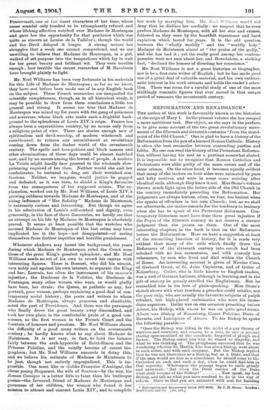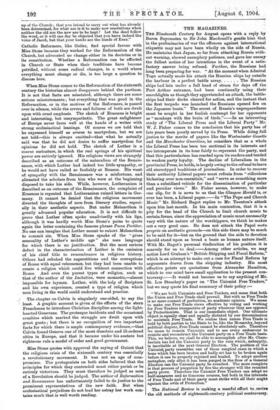of the reign of Mary L In the present volume
she has essayed a more ambitious task. Her object, as she says in the preface, is to give some account of the two great revolutionary move- ments of the fifteenth and sixteenth centuries "from the stand- point of the Old Church." One is glad to have a history of the Reformation from the pen of a learned Roman Catholic. History is often the best reconciler between contending parties and faiths. No one can read the history of the Protestant Reforma- tion without having his zeal as a partisan somewhat abated. It is impossible not to recognise that Roman Catholics and Protestants were alike guilty of the same errors and of the same crimes. On the other hand, it becomes equally evident that many of the leaders on both sides were animated by pure and lofty motives, and were in some cases striving after identical ends, although they knew it not. Miss Stone's volume throws much light upon the better side of the Old Church in the century immediately preceding the Reformation. Her judgments are always lenient, often, we fear, too lenient when she speaks of offenders in her own Church ; but, as we shall see afterwards, she makes amends for the tendency to leniency when she has to speak of the Protestant Reformers. Con- temporary historians must have done them great injustice if the Popes of the fifteenth century do not deserve a sterner judgment than she passes on them. One of the most interesting chapters in the book is that on the Reformers before the Reformation. Here we have a suggestion at least of the reconciling function of history, for it is made very evident thab many of the evils which finally drove the Reformers of the sixteenth century into revolt had been rebuked with no less earnestness, and with scarcely less
vehemence, by men who lived and died within the Church of Rome. An interesting account is given of Nicolas Cusa, of Gerhard Groot, of St. John Capistran, and of Geiler of Kaiserberg. Geiler, who is little known to English readers,
was a sort of German Latimer, although in learning and in the gift of oratory he greatly excelled the Englishman. But he resembled him in his love of plain-speaking. Miss Stone's sketch shows with what freedom a preacher could rebuke, not the poor only, who are usually the favourite subjects of pulpit rebukes, but high-placed ecclesiastics who were his imme- diate superiors. Geiler was on one occasion preaching before Albert, his Bishop, with whom he was on quite good terms. Albert was Bishop of Strassburg, Count Palatine, Duke of Bavaria, and Landgrave of Alsace. To his Bishop he spoke the following parable :-
"Once the Bishop was riding in the midst of a gay throng of warriors and courtiers, and coming to a field, he saw a peawcit staring open-mouthed at the cavalcade, forgetful of plough and furrow. The Bishop asked him why he stared so stupidly, and what he was thinking of. The ploughman answered that he was wondering whether St. Martin, who was also a Bishop, went about in such attire, and with such company. But the Bishop replied that he was not there then as a Bishop, but as a Duke, and that if the man would see him as a churchman he should come to the Cathedral on such and such a day, when he could find him in that capacity. Whereupon the peasant began to smile grimly and answered: ' But when the Devil carries off the Duke
what shall become of the Bishop ?' Now speak, my lord Bishop, and toll us what you have resolved to do in the way of reform. Show us that you are animated with zeal for building
• Reformation and Bancassance (circa 1677-1610). By 3. M. Stone. London t Duckworth and Co. [16s. net.]
up of the Church ; that you intend to carry out what has already been determined, for what use is it to make new resolutions when )rieither the old nor the new are to be kept ? Let the deed follow the word, or it will one day be objected that you have indeed the voice of Jacob, but that your hands are the hands of Esau."
Catholic Reformers, like Geiler, find special favour with Miss Stone because they worked for the Reformation of the Church, but advocated no change either in its doctrine or in its constitution. Whether a Reformation can be effected in Church or State when their traditions have become petrified, without some radical changes, in a world where everything must change or die, is too large a question to discuss here.
When Miss Stone comes to the Reformation of the sixteenth century the historian almost disappears behind the partisan. It is not that facts are misstated, although there are some serious misstatements ; but everything that was good in the Reformation, or in the motives of the Reformers, is passed over in silence, while the errors and failures of both are dwelt upon with cruel emphasis. The sketch of Erasmus is bright and interesting, but unsympathetic. The great enlightener of Europe never fares well at the hands of a writer with strong ecclesiastical leanings. Of course we are told that he expressed himself as averse to martyrdom, but we are not told—this is always omitted—that what he actually said was that he did not desire to suffer martyrdom for opinions he did not hold. The sketch of Luther is a coarse caricature, in which the real springs of his spiritual power are entirely ignored. His religious views are strangely described as an outcome of the naturalism of the Renais- sance, with which Luther had indeed too little sympathy, or he would not have railed so foolishly at Reason. His want of sympathy with the Renaissance was a misfortune, and alienated the scholars from him who were at the beginning disposed to take his side. While, however, Lutheranism is described as an outcome of the Renaissance, the complaint of Erasmus is repeated that Lutheranism ruined letters in Ger- many. It cannot be denied that the religious movement diverted the thoughts of men from literary studies, especi- ally in their aesthetic aspects. But under Melanothon it greatly advanced popular education. It is not difficult to prove that Luther often spoke unadvisedly with his lips, although it was hardly worth Miss Stone's pains to quote again the letter containing the famous phrase Pecca Fortiter.
No one can imagine that Luther meant to exhort Melancthon to commit sin. When Miss Stone speaks of the " gross sensuality of Luther's middle age " she uses language for which there is no justification. But the most serious defect in the characterisation of Luther is the omission of his chief title to remembrance in religious history.
Others had rebuked the superstitions and the corruptions of Rome with equal vehemence, but they had been unable to create a religion which could live without connection with Rome. And even the purest types of religion, such as that of the author of the Imitation, were monastic,—almost impossible for laymen. Luther, with the help of Scripture and his own experience, created a type of religion which men living in the world could understand and practise.
The chapter on Calvin is singularly one-sided, to say the least. A graphic account is given of the efforts of the stern Frenchman to introduce Christian discipline among the light- hearted Genevans. The grotesque incidents and the occasional cruelties which marked the struggle are dwelt upon with great gusto ; but there is no recognition of two important facts for which there is ample contemporary evidence,—that Calvin found Geneva one of the most dissolute and ill-ordered cities in Europe, and that it became under his austere but righteous rule a model of order and good government.
Miss Stone quotes with approval the saying of Guizot that the religious crisis of the sixteenth century was essentially a revolutionary movement. It was not an age of com- promises. The protagonists on both sides believed that the principles for which they contended must either perish or be entirely victorious. They must therefore be judged as men of a Revolution should be judged. The author of Reformation and Renaissance has unfortunately failed to do justice to the prominent representatives of the new faith. But when ecclesiastical prejudices do not lead her astray her work con- tains much that is well worth reading.







































 Previous page
Previous page